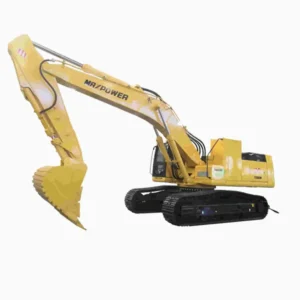Introduction
Excavators are the kings of construction sites. They’re huge, powerful machines that can move mountains (literally!) and shape landscapes with precision. But have you ever wondered what it takes to operate these behemoths? Studying a 20 ton excavator can teach you more than just how to dig trenches or demolish buildings – it can also give you insights into engineering, mechanics, and physics. In this post, we’ll explore 10 awesome things you can learn from studying these amazing machines, so buckle up and get ready for an exciting ride!
What is an excavator?

An excavator is a construction vehicle used to dig holes, trenches, and foundations. Excavators have a long arm with a bucket on the end that is used to dig. The arm can be extended and retracted, and the bucket can be rotated. Excavators are also equipped with a cab that sits on top of the machine. The operator sits in the cab and uses a joystick to control the arm and bucket.
How does an excavator work?
An excavator is a construction vehicle that has a large arm with a bucket on the end. The operator sits in a cab at the base of the excavator and uses joysticks to control the arm and bucket.
The excavator’s arm is hinged at the base. The operator raises and lowers the arm using hydraulic cylinders. The bucket is also attached to the arm using hydraulic cylinders. The operator can rotate the bucket 360 degrees.
The tracks of an excavator are driven by hydraulic motors. The operator can move the tracks left and right using two joysticks in the cab. One joystick controls the left track while the other joystick controls the right track.
The hydraulic system of an excavator is powered by a diesel engine. The engine drives a pump that pressurizes hydraulic fluid. The fluid then flows to the cylinders that operate the arm and bucket, as well as to the motors that drive the tracks.
What are the benefits of using an excavator?

If you are looking for a powerful and versatile machine to help with your construction projects, an excavator is a great option. Excavators can be used for a variety of tasks, including digging, trenching, and demolition. They are also one of the most popular heavy equipment options on the market.
There are many benefits of using an excavator. One benefit is that they are very versatile machines. Excavators can be used for a variety of tasks, including digging, trenching, and demolition. Another benefit is that excavators are powerful machines. They can easily dig through tough materials, such as concrete and rock. Additionally, excavators are relatively easy to operate. Even if you have never operated a heavy piece of machinery before, you should be able to figure out how to use an excavator with relative ease.
If you are considering adding an excavator to your fleet of construction equipment, keep these benefits in mind. Excavators can save you time and money on your construction projects.
10 things you can learn from studying an excavator

An excavator can teach you a lot about how to operate heavy machinery. You can learn about the different parts of an excavator and how they work together. You can also learn about the different types of soil and how to excavate them.The 20 ton excavator is a heavy duty machine that is used for construction and mining purposes. It is one of the most popular excavators on the market due to its versatility and power. This machine can be used for a variety of tasks, such as digging trenches, hole drilling, and demolition. It is also used for loading trucks and other vehicles with materials. The excavator has a bucket that can hold up to 20 tons of material, making it ideal for large jobs. The machine is powered by a diesel engine and has tracks that allow it to move around easily.A 20 ton excavator is a powerful machine that can be used for a variety of construction projects. It is important to choose the right excavator for the job, and a 20 ton excavator can handle most tasks. They are typically used for digging foundations, trenches, and other large holes. Excavators can also be used for demolishing buildings and clearing land. When selecting an excavator, it is important to consider the size of the project and the type of terrain. A 20 ton excavator should be able to handle most construction projects.
Conclusion
In conclusion, studying a 20 ton excavator can be an incredibly rewarding experience. Not only will you learn about the various functions and features of an excavator, but it is also a great way to develop problem-solving and critical thinking skills. With the knowledge that you gain from studying this machine, you will be able to better understand how construction sites and similar industries operate in order to identify areas for improvement or efficiency gains. Taking the time to study a 20 ton excavator is certainly worth your while!






-150x150.webp)
